
|
Mental, Emotional and Personal Issues |
Mental Issues

|
refer to loss of cognitive ability with altitude. This is a subtle phenomenon as the climber is unaware of its occurrence. How COULD he be aware of it? It is not possible as seen in the following argument.
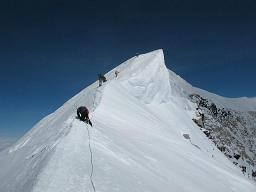
|
| summit ridge |
Suppose a high altitude mountaineer is aware of his diminished mental (and decision making) abilities. That awareness alone would then indicate a level of cognition that runs counter to the original premise that mental capacity is wanting. As a contradiction results, the original premise must be false.
Poor decisions at extremely high altitude have the potential for fatal consequences. On an expedition such as mine, all major decisions are handled by the lead guide, possibly in conferral with headquarters stateside. The benefits of experience are then paramount, leading to a vastly diminished probability of error.
Guided Mount McKinley expeditions are nearly immune from serious life-threatening events - an observation suggesting such experience is critical in mitigating any altitude-induced errors of judgement.
Then too one generally ascends the West Buttress slowly enough that altitude issues are an uncommon event in the first place. In contrast at Aconcagua, Kilimanjaro and elsewhere altitude is the prevalent factor in aborted climbs. Both venues see a roughly one-in-three success rate - yet at Mount McKinley the rate is typically a bit over one-half.
I can offer two observations. First, anybody qualified to attempt Mount McKinley through private enterprise is sufficiently versed in mountaineering savvy that they know how to avoid serious altitude-induced illness. This does not, however, preclude the possibility of a given individual acquiring HACE or HAPE through simple "bad luck": there is no correlation between propensity for altitude illness and level of physical fitness.
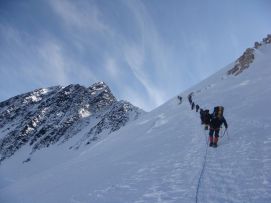
|
| nearing Denali Pass |
Second, and as already noted, the load-bearing requirements at Mount McKinley force one to climb the route slowly. A Wilderness boundary just north of Kahiltna Base Camp precludes use of motorized vehicles at Mount McKinley - except for emergencies. This is why Base Camp is located on the Kahiltna glacier's southeast fork: a perfectly good landing zone exists just south of Kahiltna Pass, at the head of the eponymous glacier at 9,700 feet or thereabouts. Indeed, that area was used in the first ascent of the West Buttress Route by Bradford Washburn in 1951.
In a world without antiquated rules expeditions would be allowed to start at 9,700 feet fully 3,000 feet higher (than the base of Heartbreak Hill) and 7 miles closer to the summit. It would nearly halve the food requirements (because energy consumed is exponential in total distance traveled and elevation gained); and certainly make for a shorter expedition duration. On the negative side there would be more altitude-related illnesses.
I never feel a twinge of altitude at ABC (14,300 feet), and attribute this to having ascended at roughly 1,000 vertical feet daily as averaged over the expedition's first week. Indeed, I have a most favorable 88% blood oxygen saturation at ABC - even just two hours after arrival.
I do, however, feel the lack of oxygen upon reaching our 16,400 foot cache point. This is normal. I am not lightheaded - yet the thicker air of our magnificent vista looking down 9,000 feet to the Kahiltna Glacier is surely missed!
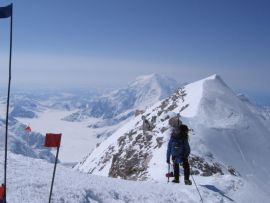
|
|
West Buttress ridge just above the fixed ropes. |
Lack of oxygen is definitely a factor for anybody's summit day, as one has generally slept at High Camp only a pair of nights at that point. Performance wanes considerably as evidenced by the typical time-to-summit of eight hours - a meager 400 vertical feet an hour. One simply cannot do much better than that in the rarified air.
In this matter Aconcagua is the more difficult venue, being fully half a vertical mile higher still. I experienced cerebral hypoxia above 21,500 feet over there, inducing obvious mental incapacity: spoken words and the corresponding people were difficult to connect!
One positive aspect of climbing Mount McKinley in June rather than May is that the resulting pressure altitude is lower as a result of warmer temperatures. I have demonstrated this phenomenon with rigorous application of first principles, the resulting data in agreement with observation. The effect is sufficient as to "lower" the summit by several hundred feet - a signficant amount of note to all mountaineers.
Emotional Issues

|
ajor psychological forces are at work when living (existing?) on a mountainside for nearly three weeks. One abandons all the usual comforts of home in an (equitable?) trade-off for reaching the summit. The indoor plumbing (with free-flowing water); artificial lighting (and thus an enjoyable evening); microwave oven (and thus instant hot food); television (mind-numbing entertainment). Not to mention a comfortable bed and a hot shower.
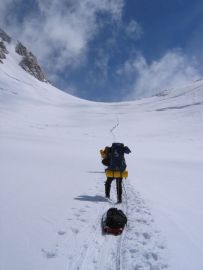
|
| nearing Windy Corner |
Presumably one does not embark on a major expedition without having already relegated these objects of modern life to the back burner of one's expectations.
Nevertheless, when you add cold (very cold?) temperatures; unavailability of your favorite foods (I adore ice cream); and oxygen starvation, the pressures for a more cushy existence mount.
Often these desires manifest in extended conversation regarding what food is to be eaten at the first post-climb feast. Thoughts of meal-sized salads; nachos, pizza, and steak are commonplace.
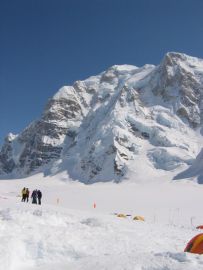
|
|
Mount Hunter from Kahiltna Base Camp. |
I am absolutely certain that the vast majority of Americans would not tolerate a single night camping - let alone doing so halfway towards the stratosphere. They insist on motels when traveling, with nary a thought of how they would comply to a regimen of sleeping bag and tent on a bed of snow.
I actually rejoice when learning of a major electricity blackout - all those people are suddenly plunged into camping mode. It's how humans existed for all but the past 150 years, and serves a great lesson after which one is suitably humbled, appreciative all-the-more for all those modern conveniences that are supposed to make one happier.
I equally suspect that the majority of Third World inhabitants would easily adapt, and accept such a lifestyle - if and only because their own experience is far more similar to overnight camping. The paucity of oxygen, however, would still be problematic unless they hail from Bolivia or Tibet.
So how many of us want to go home? I doubt that any naysayer speaks truthfully. That is NOT demonstrating a lack of faith in the expedition, nor in the eventual success of its purpose. Rather, one simply puts up with the hardship for the greater goal to which we all are entirely devoted.
Mount McKinley accentuates these issues more than any peak I've ever challenged on its terms.
It is what it is: a place never designed nor intended for human habitation. It is an alien, surreal and
altogether uncommonly inhospitable environment where we are mere visitors for a brief period.
That this venue is indeed hostile and thus overwhelmingly threatening to one's psyche is proven:
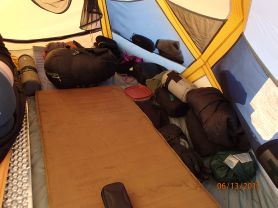
|
|
Adam's tent belongings are tidier than most. The sleeping bag is unfurled later. (DC) |
One is best advised to climb this mountain in piecemeal fashion. To contemplate reaching its top when dropped off at Base Camp is overwhelming. Instead, choose smaller, more immediately feasible goals. For myself that means reaching the next camp, or, closer still, enjoying the next hot meal.
It helps to have notes from home written by loved ones, opened regularly to lift the spirit and provide motivation for why you are going through all of these trials. Have them placed in a sealed envelope and keep it safe from the elements within a "tent bag" having items only used while inside it such as any medicines and reading material.
I even bring a "tiny beaver", at most 2 ounces, who constantly smiles at me with his buck teeth from atop the tent's interior. He's simply too cute to be ignored. For others a satellite telephone might be of significant benefit to merit its weight. Whatever works.
Personal Issues

|
his is a grab bag of assorted items - the snoring sleeper; the person who wants the same meal every morning when others desire change; those who first break down the tent while others wish to eat breakfast first; the person who continues climbing while others desperately need a break.
On a guided expedition such as the current one many of these issues are obviated: there is no food choice each morning; one drinks and eats precisely when hot water suddenly becomes available - deconstructing the tent waits. And the decision to move or stay put is made for you, presumably with the collective (rather than individual) benefit in-mind.
The expedition is a miniature society wherein every participant must cooperate with every other member in order for the entire team to function efficiently. When problems arise they can be discussed, and, most commonly, compromises are then made. For our climb the responsibility of rectification falls squarely on the guide(s).
On Mount McKinley any personality conflicts can be magnified since often the weather can turn terribly "south" in very short order. The resulting stressful situation often brings out the worst in people, their inner selves laid bare for the first time.
Indeed,
We are never tested to that extent. Others have been.
I have already hinted at the thorniest issue - how do you tell somebody they cannot climb with you because it compromises the safety and success of all remaining participants? This is most assuredly a "personal issue" par excellence.
The best of all worlds exists when the slower (or even injured) person understands the issues; and, in a show of sportsmanship and moral rectitude, offers to voluntarily withdraw from the group.
Fortunately this action was well demonstrated by every client, voluntarily turning around without having to be forced into it.
Quoting Clint Eastwood,

|
| Climbers at 14,000 feet approach Advance Base Camp. |
| previous page - Epilogue | next page - Meteorology |